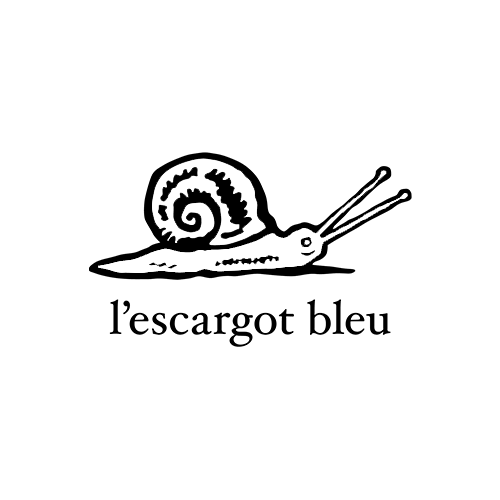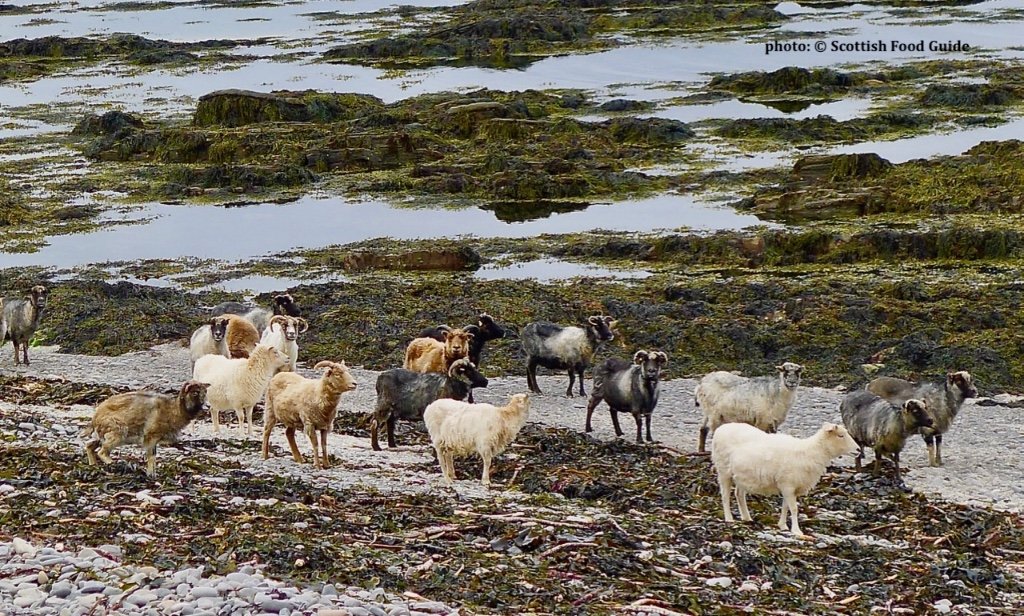Fred's newsletter 27.4.21
The ancient breed of sheep on the shore. Image: Wendy Barrie, Scottish Food Guide.
Good morning,
Some fabulous news. North Ronaldsay mutton is on the menu this week. The last time we were able to get some was a good couple of years ago, and that is a long time to wait. Get your brain ready, it is a real treat for your taste buds.
These animals are (almost) wild, living on the tiny island of North Ronaldsay in the Orkney Isles. They have to work hard to survive, feeding themselves mainly on seaweed on the shore, and grass when the tides are high. They are very limited in number, nearly washed off the map but fortunately they survived extinction. Listed on Slow Food’s Ark of Taste register, it wasn’t possible to get hold of them for the last few years, as in order to preserve their status they had to be slaughtered on Orkney, and the main Orkney abattoir closed many months ago.
I am told the ones we are receiving travelled from North Ronaldsay by boat to Orkney, then moved on again by boat to an abattoir in Lerwick, Shetland. A long trip some of you will think, but necessary for the survival of the breed. I’m excited to be able to share a taste of a pure Scottish breed with you, that has such a great heritage. I shared a recipe a couple of years ago if you’re interested.
April is the season of fresh morels and this is also great news, as they make a nice change from regular mushrooms. They have a very subtle flavour and picking them is a story of love.
When I am lucky enough to be at my little house in France at this time of the year, trying to find morels in the woods is like mission impossible. Only the locals and the older generation know where to find them, and they don’t share the picking locations with anyone, especially with a foreigner! They are family secrets passed down through the generations.
But sometimes I have been lucky to be able to buy them at the Brioude’s market, a few miles from the house, and they are fairly cheap there. I’ve been known to buy 2 or 3 kilos at a time managing to eat them all over a day or two. Usually enough to satisfy me until the following year. Some will end up in a pan with crème fraîche or a couple of eggs for breakfast with the loved one, and the rest might end up in a rabbit casserole or with a roast chicken cooked over the fire. Right now, I can’t think of a better way of sharing them with you than in a veal fillet white pudding; veal from Peelham Farm of course.
The boudin is a culture all of its own. Every area in France has its own recipe for black or white, with ceps, red fruits, apples, using the pig head, or the trotters or both. In Montpellier, they favour a jumbo black pudding made with tongue, and in Normandy they add shredded meat to it. The white pudding can also be made with chicken, or pork with crème fraîche. So morels and veal it will be this week.
I promised I would return to my young chef story, and writing about morel foraging in France has put me in the mood, so here we go.
Sometimes life can take a turn, and a helping hand reaches towards you. Let me tell you about my first job after my apprenticeship, which I finished on the 7th July. Our family lived on the sixth floor of a tower in the city centre of Joué-les-Tours in the Loire Valley. My neighbour Pascal who lived on the ninth floor was also a chef. He was older than me. One evening he phoned to tell me that one of his chef friends had broken an arm and couldn’t go to Corsica for a job as planned. So he asked me if I would cover him for two months.
I had no idea where Corsica was or how to get there. I had a restricted budget, and as there was no internet in those days I couldn’t just Google to find out how to get there. But ‘Corsica’ sounded attractive so I said yes. The idea of traveling and cooking under the sun was exciting, and two months wasn’t a great commitment, what could I lose.
I visited the local train station to make enquiries: take a train to Marseille via Lyon I was told. I was happy with that. Then I needed to figure out how to get to Corsica, so I asked a few friends. Some told me just to arrive at Marseille then take it from there. I asked my grandmother who said it should not be a problem from Marseille, I could catch a boat. My parents were on holiday at the time and I had no way of getting in touch with them.
Anyway, few days later I am on the train to Marseille not really knowing where I am going. I’m wearing a jumper and a thick winter jacket. I have very little cash, just enough for the ferry once there. It’s very early morning that I set off and I arrive at the station in Lyon late morning. It’s like a factory, a big one, extremely busy. It’s a battle to find the platform for my train to Marseille. But I am ok, a bit lost maybe. Being on my first real big trip is a strange feeling. I’m only a few months away from turning 18.
I find my seat on the train and my mind starts whirring, wondering where this is all taking me. I am going to be working at a little holiday town by the sea called Propriano. I was told someone called Gerard would be waiting for me at the port in Ajaccio when I arrived in Corsica. I needed to look out for a white Peugeot 205. I have accommodation provided, and was told we would be cooking lunch and dinner for 60 guests whilst looking at the sea from an open kitchen. I would earn around 6000 francs a month. I had not earned much from my apprenticeship, roughly 2500 francs, just enough for a few beers and petrol for my moped. That’s about all I knew. It sounded marvellous.
It’s now early afternoon and I am arriving at St Charles station in Marseille. God it is so busy. I mean busy with hundreds of people walking and rushing everywhere. It’s hot, I am carrying two bags and I have to find out where I am going. I know my boat isn’t leaving until 9pm, and I ask someone where the port is. “Straight down that street” I am told. I am walking, and it soon becomes a hard trip. It is very hot. I get to a port with lots of boats, but all quite small. I couldn’t imagine any of them would take me to Corsica. I knew it was an all-night crossing.
I see a sign for boats to hire and a few people inside a shed talking. I approach them, “where can I find the boat that goes to Corsica?” I ask. All of them burst out laughing. There I am in my winter jacket looking like I was dropped from the moon. One comes forward and asks, “where are you from and where are you going?” I tell him and he wishes me luck as he tells me to follow the road by the sea, to get a taxi if I can as it’s a fair walk. There’s no question of me being able to afford a taxi, so I start walking. After a few miles I arrive at La Joliette, a much larger port. The boat I am looking for is actually a ferry. ☺︎
I can see the ticket centre. There are long queues of vans, cars and buses. I wait for what feels like hours to take my place at the front of the queue. “One ticket for tonight’s ferry to Ajaccio please, the cheapest one!” I am told the price, I ask if there’s anything cheaper. No, that’s the cheapest. I don’t have enough money.
I feel someone tapping my shoulder. “What are you going to do in Corsica?” he asks. “Is there someone waiting for you there?” “Yes, Gerard,” I answered, “I am going to work as a chef.” The man looked at the lady behind the counter and said “please give this young lad a ticket, with a bed, and I will pay for it”. He then gave me a bit of cash for food. We didn’t see each other again on the ferry that night.
The next morning I am with Gerard in his little 205 on my way to the Sampiero Corso holiday village. We listened to Dire Straits’ Sultans of Swing album the whole way. I then enjoyed a couple of months under the sun with a fabulous bunch of people. Corsica was a great experience.
Life takes an unexpected turn sometimes and a helping hand comes forward. Hospitality is based on the principle of generosity and we must not forget this basic, or rule I should say. I hope some youngsters are reading this, I worry that generosity and humility are fading away. We must get this back.
The last 12 months have been dreadful but we fought it. We have received an enormous amount of support and help from all who have ordered take-aways, from all who have sent us kind messages, from those who have offered and sent support, providing us with a light at the end of the tunnel. I am grateful and I am blessed. This is a deep thank you from my heart.
I have written a lot today. It took some serious thought to link an experience from my life to express my thanks and feelings. I am so looking forward to open. I feel that, as happens so often in life, that l'escargot is not a blank canvas but certainly at the start of a new chapter!
This week’s take-away menu is now online, and there’s is no need for me to bore you more, so I’ll quickly list some highlights: monkfish cheeks, squat lobsters, boudin blanc, morels, duck confit in a Garbure-style stew, North Ronaldsay mutton, more rabbit, lemon tartelette, pear tarte, artichoke crudités, organic veal, and so much more. Oh, and hopefully we will get the first of the season’s mackerel this week.
I will leave you with a few words from Johnnie Balfour of Balbirnie Home Farms in Fife. We recently joined the Pasture For Life association as a way of showing our commitment to support farmers breeding and growing in the best ways possible for animal welfare. Johnnie has been a member of PFL for 5 years, and currently sits on their board of directors.
Merci encore et à bientôt,
Fred

